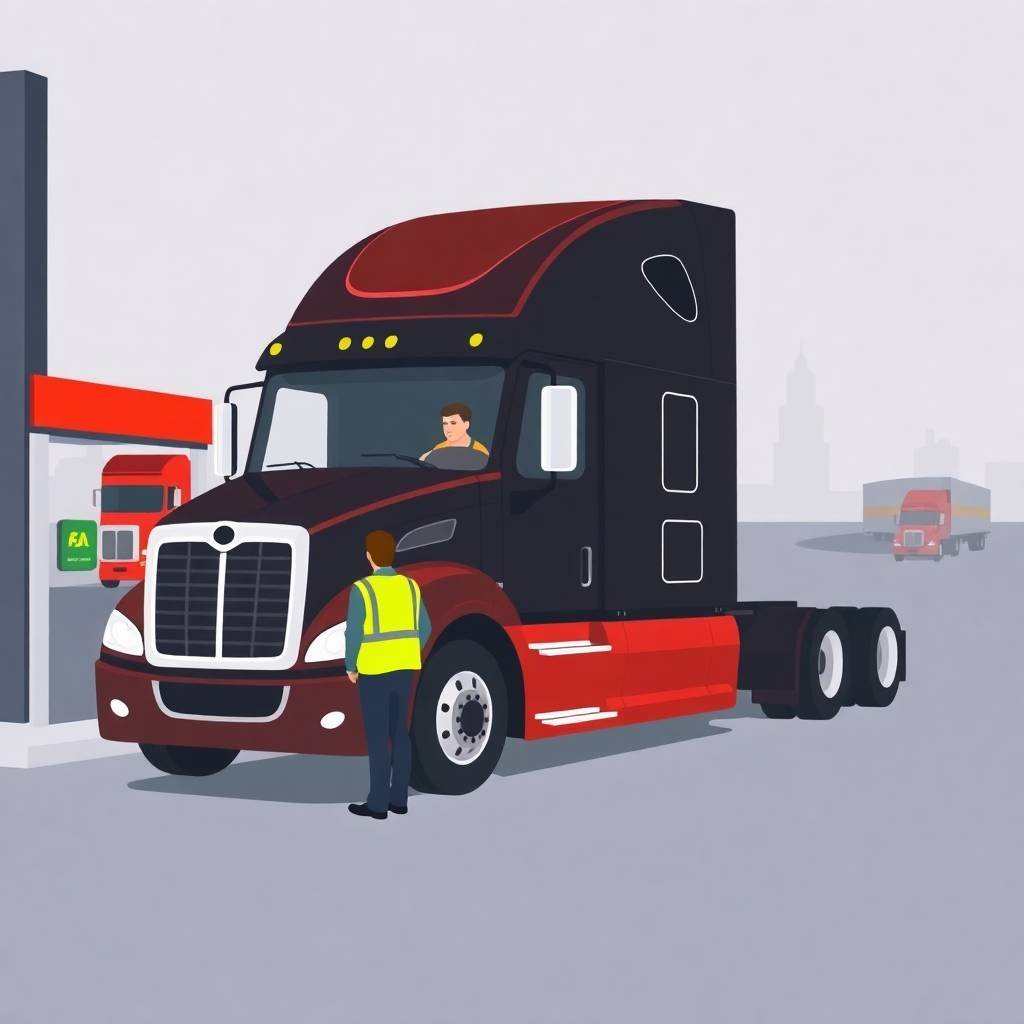1. Understand the Basics of FMCSA Insurance Filing Requirements
For motor carriers operating in interstate commerce, staying compliant with FMCSA Insurance Filing Requirements is not just good business practice—it’s a legal necessity. Failure to meet these requirements can lead to costly penalties, suspension of operating authority, or even revocation of your DOT number. Understanding these regulations ensures your company remains on the road and avoids unnecessary legal and financial setbacks.
What Are FMCSA Insurance Filing Requirements?
The FMCSA Insurance Filing Requirements are a set of mandatory filings submitted by your insurance provider to the Federal Motor Carrier Safety Administration (FMCSA). These filings verify that your company holds the minimum levels of public liability and cargo insurance as mandated under federal transportation law. The exact forms you’ll need—such as BMC-91, BMC-34, or BOC-3—depend on your operations and classification.
More details are available directly from the FMCSA website, but navigating the system can be complex. That’s why many carriers turn to Truckers Compliance Hub for guided support.
Who Must File Insurance with the FMCSA?
If you operate as a for-hire carrier, freight forwarder, or broker across state lines, you are required to comply with FMCSA Insurance Filing Requirements. This includes meeting public liability minimums and filing a BOC-3 form designating a process agent.
If you’re unsure whether your operation qualifies, it’s recommended to schedule a consultation to discuss your specific case and avoid unnecessary violations.
Why Filing Correctly Matters
Accurate insurance filings are critical during audits, safety reviews, or registration renewals. Mistakes can trigger issues during a DOT audit or lead to DQ file violations. Businesses that ignore filing obligations often face added scrutiny under the FMCSA Safety Measurement System (SMS) 2025, impacting safety scores and business opportunities.
Avoiding Common Mistakes with Filing
Many companies face penalties due to incomplete or outdated filings. Our guide on FMCSA compliance mistakes helps identify the most frequent errors and how to prevent them. Combine that with our driver qualification file requirements and DOT compliance checklist for owner-operators, and you’ll have a strong foundation for passing audits and maintaining good standing.
Integrating FMCSA Filing with Broader Compliance
FMCSA Insurance Filing Requirements are just one part of a broader compliance strategy. Your operation must also align with drug and alcohol testing management, CSA intervention thresholds, and UCR filing deadlines. For owner-operators and fleet managers alike, our compliance services offer a comprehensive solution.
Support Resources for Trucking Companies
For added guidance on FMCSA insurance filings and more, explore these helpful resources:
- Pre-employment DOT drug testing requirements
- Random DOT drug testing requirements
- Driver drug and alcohol testing program
- IFTA, IRP, and BOC-3 support
- New entrant safety audit survival tips
Visit our homepage at Truckers Compliance Hub to see the latest and previous posts, or learn more about FMCSA compliance help for trucking companies.
Final Thoughts
Understanding and complying with FMCSA Insurance Filing Requirements is crucial for protecting your operating authority and reputation. With the right tools and support—from driver safety score management to how to correct FMCSA violations—your company can stay on track, avoid penalties, and grow safely.
To ensure full legal protection, please review our Disclaimer and Terms of Service before using our services.

2. Identify Which Insurance Forms Apply to Your Operation
Navigating the FMCSA Insurance Filing Requirements can be overwhelming for new and experienced motor carriers alike. The Federal Motor Carrier Safety Administration (FMCSA) mandates specific insurance filings based on your operation type—whether you’re a for-hire carrier, broker, or freight forwarder. Failure to submit the correct insurance forms can result in revoked authority, costly fines, or serious compliance issues. Knowing which forms apply to your operation is essential for staying compliant and protecting your business.
Understanding FMCSA Insurance Filing Requirements
The FMCSA Insurance Filing Requirements are designed to ensure that every motor carrier operating in interstate commerce has adequate liability coverage. These filings are made directly to the FMCSA by your insurance provider. Common forms include the BMC-91 (or BMC-91X), which verifies liability insurance, and the BMC-34 for cargo coverage.
To get a full understanding of the rules that apply to your business, visit the official FMCSA website or the U.S. Department of Transportation. For step-by-step help, consider scheduling a compliance consultation with a professional advisor.
Which Insurance Forms Apply to You?
Your required forms depend on your operation type:
- For-Hire Motor Carriers operating across state lines typically need to file the BMC-91 or BMC-91X, which confirms public liability insurance.
- Freight Forwarders may need both the BMC-34 for cargo and BMC-91X for liability.
- Brokers must file a BMC-84 or BMC-85 to meet surety bond requirements.
- All entities must file a BOC-3 designating a process agent, which can be done through IFTA/IRP/BOC-3 support services.
Each of these falls under the umbrella of FMCSA Insurance Filing Requirements, and ensuring accuracy in your filings is critical.
Avoiding Common Compliance Mistakes
Mistakes in insurance filings are among the most frequent FMCSA compliance mistakes. Incorrect or missing forms can trigger DOT audits or jeopardize your authority. Ensure you’re also maintaining accurate driver qualification files and staying current with your DOT compliance checklist.
Our comprehensive services help carriers avoid such pitfalls through tailored compliance management, including driver safety score management and drug and alcohol testing management.
How Filing Integrates with Broader FMCSA Requirements
Filing the correct insurance forms is just one element of the FMCSA Insurance Filing Requirements puzzle. Your company also needs to ensure compliance with programs like the FMCSA Clearinghouse, pre-employment drug testing requirements, and random DOT drug testing. To support ongoing compliance, consider using our DOT compliance checklist for owner-operators.
For newer carriers, reviewing our new entrant safety audit survival tips can help prevent common early-stage violations.
Helpful Resources for Continued Compliance
Whether you’re correcting past violations or trying to avoid new ones, our tools—like how to correct FMCSA violations and CSA intervention thresholds—provide the support you need. Explore even more insights on the Truckers Compliance Hub blog and learn about broader FMCSA compliance help for trucking companies.
Final Thoughts
Correctly identifying which forms apply under the FMCSA Insurance Filing Requirements protects your authority and keeps your business moving. With support from our FMCSA compliance services for owner-operators, you can stay ahead of regulatory requirements.
Before using our services, please review our Disclaimer and Terms of Service to understand your rights and obligations.

3. Avoid the Top Mistakes That Lead to Costly Delays
When it comes to running a successful trucking operation, understanding and complying with FMCSA Insurance Filing Requirements is absolutely critical. Unfortunately, many carriers make avoidable mistakes that lead to costly delays, suspended authority, and unnecessary stress. These setbacks are often due to a lack of clarity or oversight in required filings and supporting compliance documentation. In this article, we’ll outline the most common pitfalls and how you can avoid them to keep your business running efficiently.
Failing to File the Correct Insurance Forms
One of the most common and costly errors is failing to file the correct insurance forms with the FMCSA. Under the FMCSA Insurance Filing Requirements, for-hire carriers must submit forms like the BMC-91 or BMC-91X for public liability, and freight forwarders may also need BMC-34 for cargo coverage. Brokers are required to file the BMC-84 or BMC-85 for surety bonds.
To ensure accuracy in your insurance filings, you can schedule a personalized consultation and receive step-by-step support tailored to your operation. You can also stay current by reviewing updates on the FMCSA’s official website and Transportation.gov.
Neglecting Drug and Alcohol Compliance
Drug and alcohol testing requirements are integral to overall FMCSA compliance. Many delays stem from non-compliance with drug and alcohol testing rules, such as failing to complete pre-employment DOT drug testing or maintain a random testing program.
Ensuring your program is properly managed through Drug and Alcohol Testing Management Services helps reduce risk and aligns your company with FMCSA Insurance Filing Requirements.
Overlooking the Importance of Driver Qualification Files
Another major source of delay is inaccurate or incomplete Driver Qualification Files. These are regularly reviewed during audits, and discrepancies can halt operations. Learn what to include and how to maintain compliance by referencing DQ File Violations.
Missing Critical Deadlines and Updates
Deadlines related to filings such as the Unified Carrier Registration (UCR) and IFTA/IRP/BOC-3 requirements are often missed by busy carriers. However, under FMCSA Insurance Filing Requirements, even a minor delay in submissions can trigger enforcement actions. Using our DOT Compliance Checklist for Owner-Operators can help ensure you stay on track.
Ignoring Safety Scores and Audit Preparation
Many carriers are unaware of how their performance affects the FMCSA Safety Measurement System (SMS). Poor scores can result in audits and interventions. Be proactive by using Driver Safety Score Management Services and preparing with our DOT Audit Preparation Guide.
If you’re a new entrant, don’t miss our New Entrant Safety Audit Survival Tips, and review FMCSA Compliance Requirements for Trucking Companies to stay ahead.
Preventing Compliance Mistakes Before They Happen
Avoiding costly mistakes starts with awareness and planning. Explore our blog for more insights on FMCSA compliance mistakes and learn how to correct FMCSA violations before they escalate.
Our full range of FMCSA compliance services for owner-operators and FMCSA compliance help for trucking companies is designed to give you peace of mind.
Your Compliance Support Hub
For access to additional resources, visit our homepage and browse current compliance tools and services. You can also explore the FMCSA Clearinghouse Compliance Guide and Driver Drug and Alcohol Testing Program Overview.
Before using our services, we encourage you to review our Disclaimer and Terms of Service for full transparency.
Avoid delays by taking control of your FMCSA Insurance Filing Requirements today. Let Truckers Compliance Hub be your guide to compliance clarity.

4. Work Closely with a Reputable Insurance Provider
Understanding and fulfilling FMCSA Insurance Filing Requirements is a non-negotiable aspect of operating a commercial trucking business. Whether you’re an independent owner-operator or managing a fleet, working with a reputable insurance provider is key to maintaining compliance and avoiding operational delays. The right insurance partner not only helps you meet filing mandates but also keeps you aligned with broader DOT compliance regulations.
The Importance of Insurance in FMCSA Compliance
The Federal Motor Carrier Safety Administration (FMCSA) requires specific insurance forms to be filed for different types of carriers and operations. For example, freight carriers need forms like BMC-91X or BMC-34, while brokers must submit BMC-84 or BMC-85. These documents verify that a carrier has adequate public liability, cargo, or surety bond coverage.
Working with a reputable insurance provider ensures you meet all FMCSA Insurance Filing Requirements correctly and on time. Misfilings or gaps in coverage can lead to costly delays, revocation of authority, or even shutdowns. To ensure your filings are accurate, schedule a compliance consultation here.
Navigating the FMCSA Insurance Landscape
A good insurance partner stays up to date on the ever-changing requirements published on official government sites like FMCSA.gov and Transportation.gov. They should also guide you through how these rules integrate with other areas of compliance, such as your driver qualification file requirements and drug and alcohol testing program.
By working with the right provider, you’re more likely to avoid common FMCSA compliance mistakes that can lead to fines or audits. For more guidance, refer to our DOT audit preparation checklist and learn how to correct FMCSA violations.
Integrated Compliance Solutions
Beyond insurance, your provider should understand the broader framework of FMCSA compliance. That includes support for random drug testing requirements, pre-employment screening, and maintaining compliance with the FMCSA Clearinghouse.
Comprehensive insurance services should complement tools like our DOT Compliance Checklist for Owner-Operators, UCR Filing Deadlines, IFTA/IRP/BOC-3 Support, and CSA Intervention Thresholds.
Partner with Compliance Experts
Choosing the right insurance partner goes hand-in-hand with choosing the right compliance support team. At Truckers Compliance Hub, we provide industry-specific services like drug and alcohol testing management, driver safety score management, and DOT audit preparation.
If you’re a new carrier, explore our guide to surviving the new entrant safety audit. For further information on meeting FMCSA Insurance Filing Requirements, see our posts on FMCSA compliance requirements for trucking companies and our services for owner-operators.
Stay Informed and Protected
Don’t leave your filings to chance. Keep yourself informed by browsing the latest posts and exploring resources like our FMCSA Compliance Help for Trucking Companies.
Before using any services, please review our Disclaimer and Terms of Service.
With the right insurance provider and compliance partner, you’ll be better equipped to meet your FMCSA Insurance Filing Requirements, avoid costly errors, and focus on growing your business with confidence.

5. Keep Your Operating Authority in Good Standing
Maintaining your operating authority is essential for running a compliant and profitable trucking business. A critical part of this responsibility includes understanding and adhering to FMCSA Insurance Filing Requirements. Without the proper filings, your operating authority can be revoked, causing delays and financial losses. Let’s explore what it takes to stay compliant and protect your authority.
Why FMCSA Insurance Filing Requirements Matter
The Federal Motor Carrier Safety Administration (FMCSA) mandates that all motor carriers, freight forwarders, and brokers maintain specific insurance coverage. These FMCSA Insurance Filing Requirements include forms such as BMC-91, BMC-91X, and BMC-34, which verify proof of liability and cargo insurance. Failing to submit these on time—or not submitting them at all—can lead to the suspension of your operating authority.
To avoid such risks, it’s important to work with a knowledgeable team that understands the nuances of FMCSA compliance. You can schedule an appointment here to ensure your filings are properly submitted.
Integrate Compliance Across All Areas
While FMCSA Insurance Filing Requirements are a top priority, maintaining good standing also means monitoring various compliance areas. This includes meeting drug and alcohol testing compliance standards, understanding your driver qualification file requirements, and preparing for DOT audits.
If you’re unsure where to begin, start with our DOT Compliance Checklist or use the owner-operator version for a more tailored approach. These resources can help ensure you’re aligned with not just insurance filings, but every aspect of federal compliance.
Prevent Violations Before They Happen
Non-compliance can come in many forms—missed UCR filing deadlines, incomplete DQ files, or inadequate pre-employment drug testing. These issues often stem from overlooking the importance of staying up-to-date with FMCSA Insurance Filing Requirements and related obligations.
For help correcting issues, we offer guidance on how to correct FMCSA violations, and tools for managing your driver safety scores, drug and alcohol testing program, and CSA intervention thresholds.
Use Trusted Resources and Experts
Knowledge is power. Stay informed by visiting the Truckers Compliance Hub blog for updates and insights, including posts like FMCSA Compliance Mistakes and FMCSA Compliance Requirements for Trucking Companies.
We also provide service packages for carriers of all sizes. Whether you’re a startup or an experienced operator, our FMCSA compliance help for trucking companies, services for owner-operators, and extended owner-operator solutions are designed to meet your needs.
To further support your compliance, review our policies through our Disclaimer and Terms of Service.
Stay Compliant, Stay in Business
Meeting FMCSA Insurance Filing Requirements is not just a box to check—it’s a foundational part of keeping your business legal and operating smoothly. Partner with professionals who understand the full spectrum of compliance, from IFTA/IRP/BOC-3 support to surviving new entrant audits. Staying ahead of regulations means fewer interruptions and greater long-term success.

6. Use Compliance Support Tools to Stay Ahead of Requirements
Staying compliant with all FMCSA regulations can be overwhelming for trucking companies and owner-operators. From monitoring safety scores to ensuring timely filings, each requirement is critical. One of the most important compliance responsibilities is meeting FMCSA Insurance Filing Requirements—a task that can lead to costly delays or authority revocation if neglected. Fortunately, using compliance support tools helps keep you organized and ahead of deadlines.
Stay Proactive with FMCSA Insurance Filing Requirements
The FMCSA Insurance Filing Requirements are mandatory for maintaining your operating authority. Carriers must ensure filings like the BMC-91, BMC-34, and BMC-84 are submitted correctly and on time. Missing these filings or submitting incorrect information can result in revoked authority, delayed operations, and increased costs.
With the help of compliance support tools and expert services, you can avoid common mistakes and streamline your filings. Use this appointment link to speak with a compliance specialist who can help you meet every FMCSA requirement with confidence.
Comprehensive Tools Cover More Than Just Insurance
Although FMCSA Insurance Filing Requirements are critical, true compliance spans a wide range of responsibilities. A comprehensive compliance program ensures you’re aligned with DOT compliance checklists, DQ file requirements, drug and alcohol testing compliance, and much more.
To help cover all areas of compliance, explore our owner-operator checklist, and stay updated on upcoming UCR filing deadlines and IFTA/IRP/BOC-3 support.
Avoid Mistakes That Cost Time and Money
One of the most common issues among carriers is neglecting FMCSA Insurance Filing Requirements or submitting them late. Mistakes can also arise in areas like DQ file violations, random drug testing, or driver safety score management. These problems not only impact your compliance status but can also increase your risk during a DOT audit.
Our compliance services, including drug and alcohol testing management and how to correct FMCSA violations, are designed to keep you audit-ready and penalty-free.
Leverage Trusted Resources and Services
It’s important to have access to reliable and up-to-date information. The Truckers Compliance Hub offers valuable insights on FMCSA Clearinghouse compliance, compliance mistakes, and safety measurement systems.
Our tailored services also include new entrant audit preparation, CSA intervention threshold tracking, and full compliance help for trucking companies. If you’re an owner-operator, we offer both basic and expanded compliance support packages.
Stay Ahead—Don’t Wait for a Violation
The best way to handle FMCSA Insurance Filing Requirements and other compliance tasks is through consistent monitoring and professional support. Trusted tools and services ensure you never fall behind on filings or miss a critical deadline.
Visit Transportation.gov for regulatory updates, and be sure to review our Disclaimer and Terms of Service for full transparency about our support services.
By leveraging powerful compliance tools and expert guidance, you can focus on your operations while we handle the details—keeping your authority active, your fleet safe, and your business thriving.

7. Schedule a Compliance Review to Ensure Full Coverage
Running a compliant and successful trucking operation requires attention to countless regulatory details. One area that can easily be overlooked—but is absolutely critical—is ensuring all FMCSA Insurance Filing Requirements are current and properly submitted. Scheduling a compliance review can help identify any gaps in your processes, confirm insurance filings, and ensure full coverage across every compliance category.
Why Compliance Reviews Matter
Compliance is not just about avoiding penalties; it’s about protecting your operating authority, reputation, and bottom line. An in-depth compliance review will examine your adherence to FMCSA Insurance Filing Requirements, identify outdated or missing documents, and assess overall readiness for audits. If you’re unsure whether your filings are up to date, it’s time to schedule your review with a qualified expert.
At Truckers Compliance Hub, our team specializes in helping carriers and owner-operators stay compliant with not only insurance filings but all FMCSA and DOT regulations.
Understanding FMCSA Insurance Filing Requirements
The FMCSA Insurance Filing Requirements include forms such as BMC-91, BMC-34, and MCS-90. These filings demonstrate proof of financial responsibility and must be submitted correctly to maintain operating authority. Many carriers assume their insurance provider automatically handles this, but mistakes or oversights are common. A routine compliance review ensures nothing slips through the cracks.
We also recommend exploring the DOT Compliance Checklist to make sure all other essential documentation—such as driver qualification files and drug and alcohol testing compliance—are in order.
What to Expect During a Review
During a compliance review, experts will check your adherence to key regulations, including:
- All required FMCSA Insurance Filing Requirements
- DQ file violations
- Pre-employment and random drug testing
- Driver drug and alcohol programs
- Safety measurement scores
- New entrant audit preparedness
We provide dedicated support through our DOT audit preparation and FMCSA violation correction services, ensuring that you’re fully equipped to handle any inspection or audit.
Tools and Services That Support Your Compliance Goals
A compliance review is only the beginning. Use our driver safety score management, drug and alcohol testing management, and CSA intervention threshold tracking tools to maintain long-term compliance.
For owner-operators, our compliance checklist and IFTA/IRP/BOC-3 support services offer tailored solutions that cover all FMCSA Insurance Filing Requirements and beyond.
You can also read our comprehensive articles on FMCSA compliance requirements for trucking companies and avoid common compliance mistakes by leveraging our practical insights.
Get the Support You Need
Compliance is not a one-time task—it’s an ongoing responsibility. With help from our FMCSA compliance services for trucking companies and owner-operator support plans, staying compliant becomes more manageable and less stressful.
Visit Transportation.gov to stay informed about federal regulations. Before getting started, please review our Disclaimer and Terms of Service.
By scheduling a thorough compliance review today, you can ensure full coverage, peace of mind, and long-term success in the trucking industry.

What are FMCSA Insurance Filing Requirements and who needs to comply?

FMCSA Insurance Filing Requirements are mandatory proof-of-insurance filings submitted by your insurer to the Federal Motor Carrier Safety Administration (FMCSA). These requirements apply to for-hire carriers, freight forwarders, and brokers operating in interstate commerce. The filings verify that you meet the required liability and cargo insurance minimums. To stay ahead of compliance, carriers can use tools like DQ File Setup and Monitoring to track their documentation and ensure timely filings.
What happens if I miss an FMCSA insurance filing deadline?

Missing a filing deadline under FMCSA Insurance Filing Requirements can lead to immediate suspension or revocation of your operating authority. This can halt your operations and result in financial penalties. Proactively managing filings with services like DOT Audit Preparation helps ensure you’re audit-ready and never miss a critical compliance task.
How do I know which FMCSA Insurance Filing Requirements apply to my business?

The specific FMCSA Insurance Filing Requirements that apply depend on your business type—whether you’re a motor carrier, broker, or freight forwarder—and the type of freight you transport. It’s crucial to assess your operation with professional guidance. Many carriers benefit from support services like IFTA, IRP, and BOC-3 Filing Assistance to ensure every required form is filed correctly and on time.
Can FMCSA Insurance Filing Requirements affect my safety audit results?

Yes. During a New Entrant Safety Audit or routine compliance review, inspectors verify that your FMCSA Insurance Filing Requirements are met and up to date. Non-compliance can lead to failed audits. Utilizing UCR Filing Assistance and other compliance tools helps ensure your filings are in order and audit-ready.
How do FMCSA Insurance Filing Requirements relate to drug and alcohol testing programs?

While separate from insurance filings, a complete compliance program should integrate both FMCSA Insurance Filing Requirements and testing protocols. The FMCSA requires proof of financial responsibility and an active drug and alcohol testing program for CDL drivers. Partnering with a service like Drug and Alcohol Testing Management ensures that all aspects of your compliance are handled cohesively.
Igor Iturriaga is a transportation compliance expert and founder of Dynamic 305 Miami LLC. He helps owner-operators and fleets stay FMCSA-compliant and audit-ready. https://www.linkedin.com/in/igor-iturriaga-64503217/
